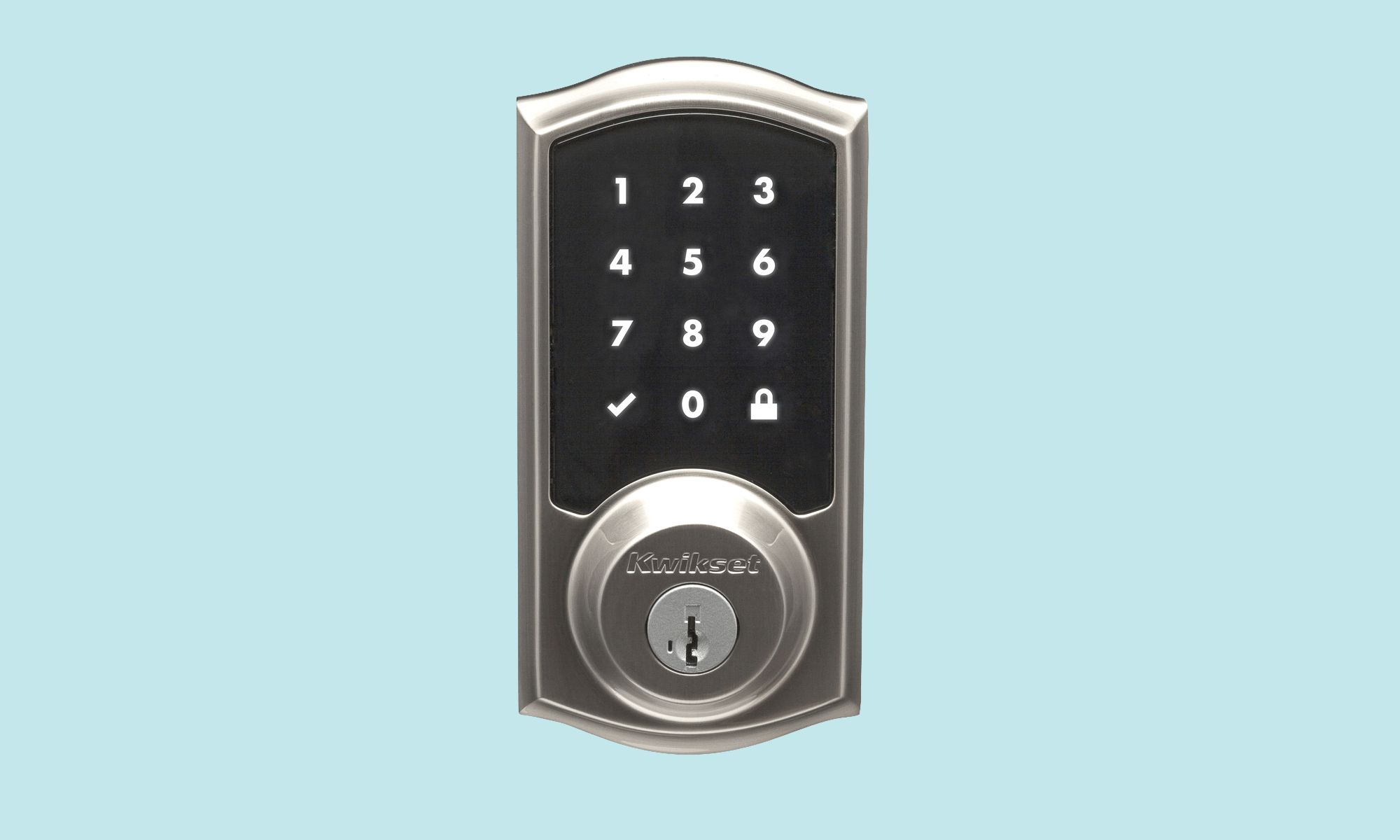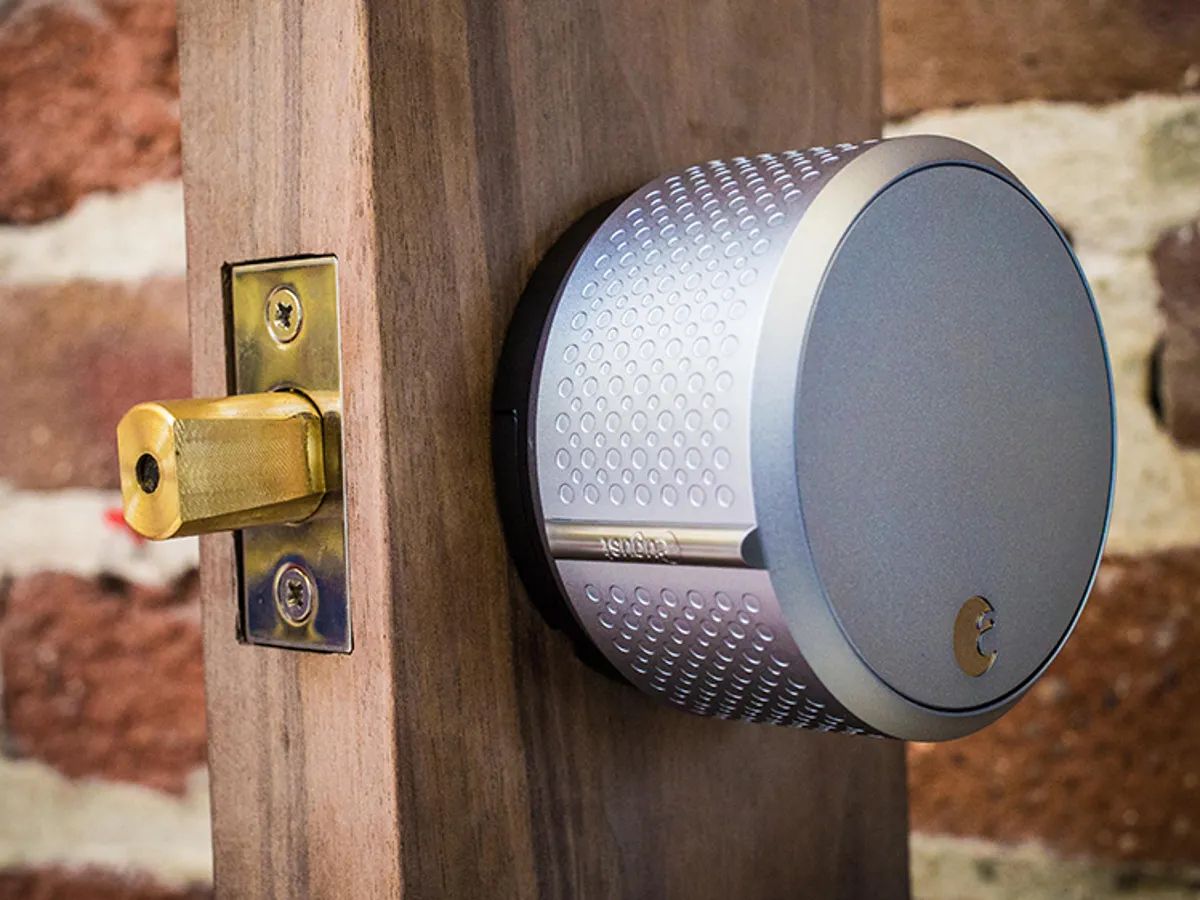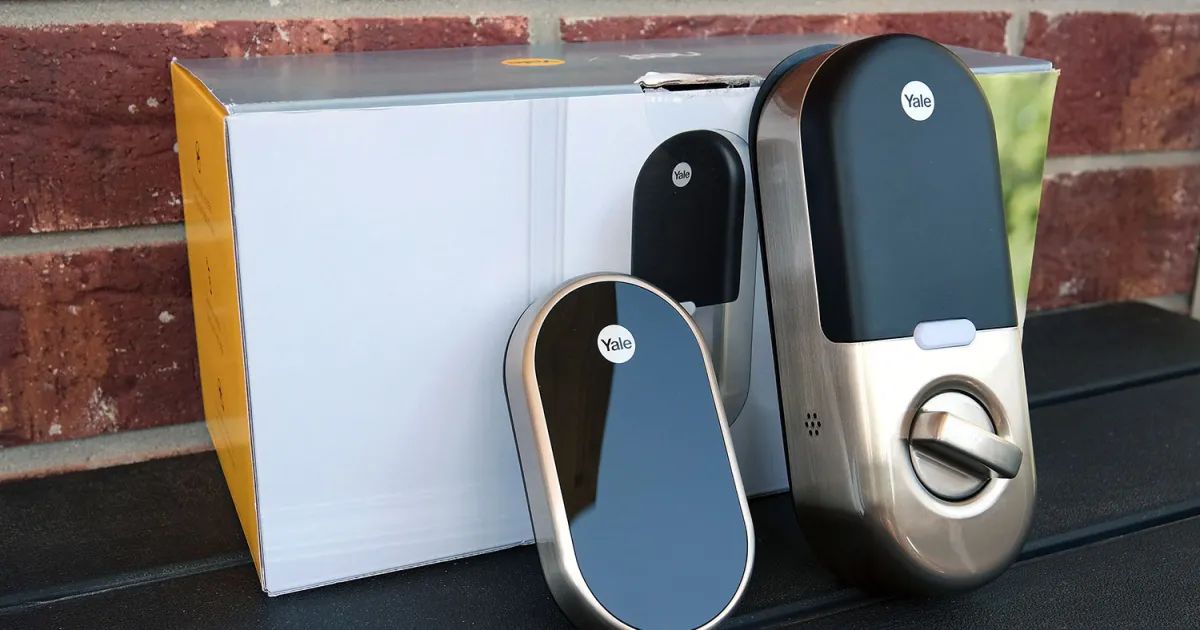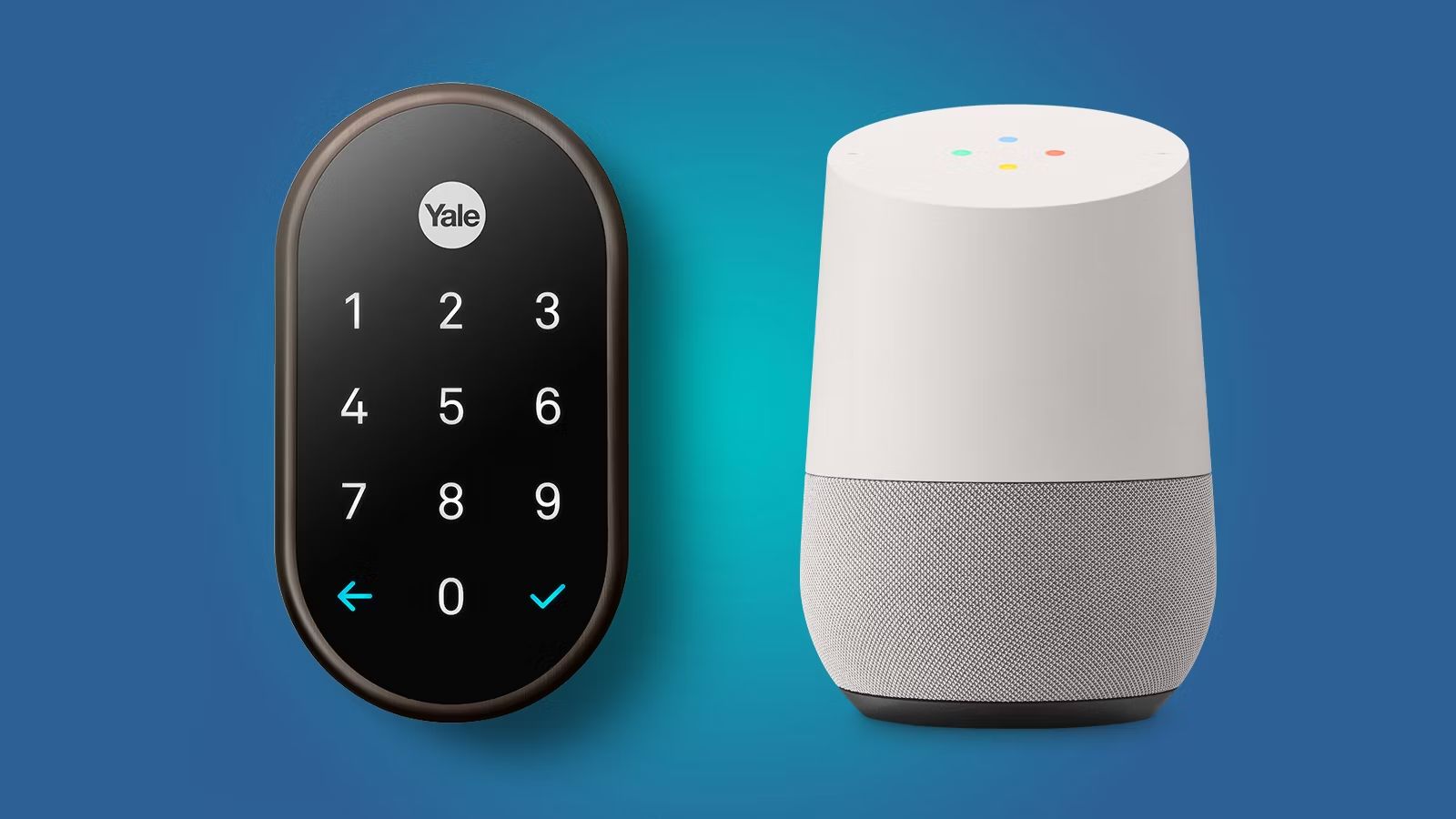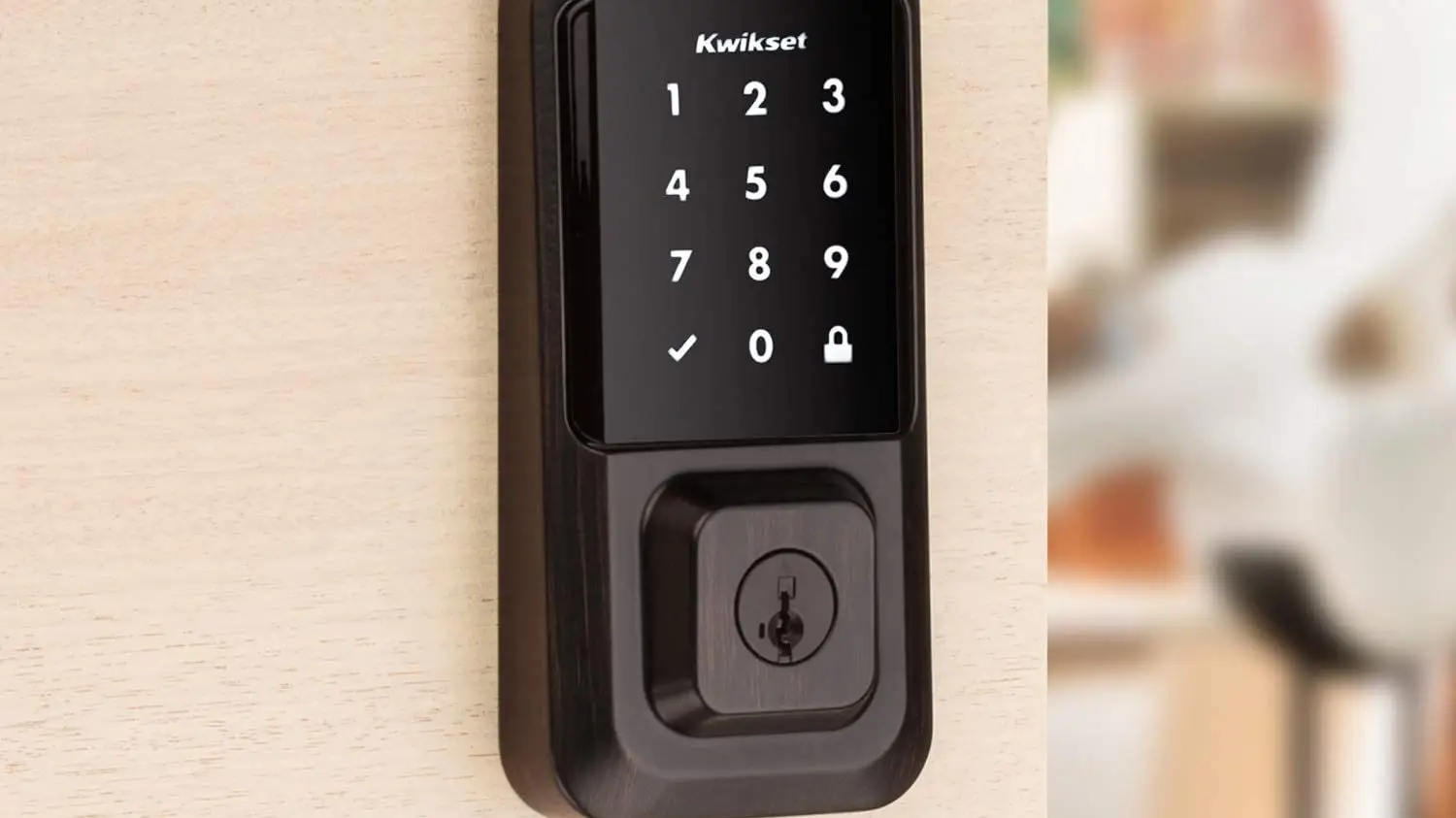Introduction
Welcome to the world of Airbnb, where homeowners and travelers connect to provide unique and memorable stays. As an Airbnb host, ensuring the safety and convenience of your guests is of utmost importance. One way to achieve this is by utilizing smart lock technology. Smart locks have revolutionized the way we secure our homes and properties, offering a wide range of benefits for both hosts and guests.
So, what exactly is a smart lock? How does it work, and why should you consider using one for your Airbnb property? In this article, we will delve into the world of smart locks and explore the various advantages they bring to the table.
A smart lock is a modern, cutting-edge device that replaces traditional locks and offers advanced security features, along with added convenience and remote accessibility. Unlike traditional mechanical locks, smart locks employ digital technology to provide secure access to your property.
The functionality of a smart lock may vary depending on the brand and model you choose. However, most smart locks can be locked and unlocked using a smartphone app, key cards, fingerprints, or even voice commands. This eliminates the need for physical keys and offers a seamless and hassle-free experience for both hosts and guests.
Now that we have a basic understanding of what a smart lock is, let’s explore the reasons why it is a valuable addition to your Airbnb property. By using a smart lock, you can enhance the security of your home, provide convenience for your guests, and seamlessly integrate with the Airbnb platform.
What is a smart lock?
A smart lock is a modern and innovative device designed to provide secure access to a property without the need for traditional keys. It utilizes digital technology to enable homeowners and guests to lock and unlock doors using alternative methods such as smartphones, key cards, fingerprints, or even voice commands.
Unlike conventional mechanical locks, smart locks offer a range of advanced features that enhance security, convenience, and remote accessibility. With a smart lock, you can bid farewell to the hassle of carrying keys and worrying about losing them.
Smart locks employ various technologies to ensure high-level security. Some models use encryption to protect access codes, while others have built-in sensors to detect tampering or unauthorized entry attempts. Many smart locks also come with features like automatic lockouts after a certain period of inactivity or the ability to generate unique access codes for each guest.
With a smartphone app or a dedicated control panel, homeowners and guests can easily manage and monitor the smart lock. They can lock or unlock the door remotely and receive real-time notifications whenever the door is accessed. This level of control and visibility provides peace of mind, especially for Airbnb hosts who may not be physically present at the property.
In addition to enhancing security, smart locks offer unparalleled convenience. Guests no longer need to worry about keeping track of keys or coordinating key handovers. They can simply use a pre-authorized method to access the property, such as a unique access code or a digital key sent to their smartphone. Hosts can easily manage multiple guests, grant temporary access, or revoke access remotely, all with a few taps on their mobile devices.
Moreover, smart locks offer flexibility in managing access permissions. For example, hosts can grant specific time-limited access for cleaning services or maintenance personnel. This eliminates the need to provide physical keys or be present during these appointments.
Overall, a smart lock is a game-changer in terms of convenience, security, and control. Its innovative features and seamless integration with digital devices make it an ideal choice for homeowners looking to enhance the guest experience while ensuring the safety of their property.
How does a smart lock work?
A smart lock operates using a combination of hardware and software components to provide secure access to a property. The exact mechanisms can vary slightly between different models and brands, but the basic principles remain the same. Here’s a brief overview of how a smart lock typically works:
1. Authentication: To gain access to a property, a user needs to be authenticated. This can be done in several ways, including entering a PIN code on a keypad, using a biometric scan like a fingerprint, presenting a key card, or using a smartphone app. The smart lock verifies the user’s identity before granting access.
2. Communication: Once the user is authenticated, the smart lock communicates with the controlling device, such as a smartphone or a central control panel. This communication can take place via a variety of methods, including Bluetooth, Wi-Fi, or even Zigbee or Z-Wave protocols.
3. Command execution: Upon receiving the command to lock or unlock the door, the smart lock’s motorized mechanism engages to perform the requested action. This can involve physically extending or retracting the latch or deadbolt, depending on the type of lock being used.
4. Sensor feedback: Smart locks often include sensors to provide feedback on the status of the door. For example, a sensor can detect if the door is left ajar or if there’s an attempted break-in. This information is relayed to the controlling device, which can then send real-time notifications to the user.
5. Power source: Smart locks require a power source to function. Most models use batteries, which can last for several months or even years, depending on usage. Some smart locks also have the option of being hardwired into the property’s electrical system for a constant power supply.
6. Integration with smart home systems: Many smart locks are designed to integrate seamlessly with existing smart home systems. This allows users to control the lock through voice commands or through their preferred home automation platform, such as Amazon Alexa or Google Assistant.
It’s important to note that smart locks prioritize security and employ various encryption methods to protect the communication between devices. This ensures that the access codes or digital keys cannot be easily intercepted or tampered with.
Overall, a smart lock combines innovative hardware and intelligent software to provide a convenient and secure access control system for your property. Its seamless integration with digital devices and advanced authentication methods make it a reliable and user-friendly solution for both homeowners and guests.
Benefits of using a smart lock for Airbnb
Using a smart lock for your Airbnb property offers a multitude of benefits for both hosts and guests. Here are some of the key advantages:
1. Enhanced security features: Smart locks provide advanced security features that go beyond traditional locks. With features like unique access codes, biometric authentication, and real-time alert notifications, you can have peace of mind knowing that only authorized individuals can access your property. Additionally, smart locks can detect and deter tampering or break-in attempts, ensuring the safety of your guests and belongings.
2. Convenience for guests and hosts: One of the biggest advantages of a smart lock is the convenience it offers. Guests no longer need to worry about carrying physical keys or coordinating key pick-ups and drop-offs with the host. They can simply access the property using a unique access code or digital key sent to their smartphone. For hosts, managing access for multiple guests becomes effortless, and there’s no need for key handovers, making the check-in and check-out process smoother and more convenient for everyone involved.
3. Remote access and monitoring: Smart locks allow hosts to remotely monitor and control access to their property. Whether it’s granting temporary access to cleaning services or receiving real-time notifications when the door is unlocked, this level of control provides an added layer of security and convenience. Hosts can use their smartphone or a dedicated control panel to lock or unlock the door from anywhere, giving them peace of mind even when they’re not physically present at the property.
4. Integration with Airbnb platform: Many smart lock systems offer seamless integration with the Airbnb platform. This means you can synchronize your smart lock with your Airbnb listing, making it easy to manage guest access and automate check-in and check-out processes. Integrating your smart lock with Airbnb can save you time and effort while providing a seamless experience for your guests.
5. Access control and time-limited permissions: Smart locks provide the flexibility to grant access to specific individuals for a limited period of time. This is especially useful for granting access to cleaning services or maintenance personnel, as hosts can provide temporary access codes or digital keys that automatically expire after the designated time. It eliminates the need to provide physical keys or be present during these appointments, streamlining the entire process.
6. Audit trail and accountability: Smart locks often include an audit trail feature, which records a log of who accessed the property and when. This can be useful for tracking guest activity, resolving disputes, or identifying any security concerns. Having an audit trail adds an extra layer of accountability and transparency to your Airbnb hosting experience.
Incorporating a smart lock into your Airbnb property offers numerous benefits, including enhanced security, convenience for guests and hosts, remote access and monitoring, platform integration, access control, and accountability. By investing in a smart lock system, you can elevate the guest experience and differentiate your Airbnb listing in a competitive market.
Enhanced security features of smart locks
When it comes to protecting your Airbnb property and ensuring the safety of your guests, smart locks offer a range of enhanced security features that go beyond traditional locks. Here are some key security benefits of using a smart lock:
1. Unique access codes: Smart locks allow you to assign unique access codes to each guest, eliminating the need for physical keys. This ensures that only authorized individuals can enter your property. Unlike physical keys, access codes cannot be easily duplicated or lost, reducing the risk of unauthorized access.
2. Biometric authentication: Some smart lock models offer biometric authentication, such as fingerprint recognition. This adds an extra layer of security by ensuring that only registered users with verified biometric data can access the property. Biometric authentication is highly secure and eliminates the risk of access codes or keys falling into the wrong hands.
3. Real-time alert notifications: Smart locks can send you real-time notifications whenever the door is unlocked or accessed. This allows you to stay updated on who is entering or leaving your property, even when you’re not physically present. These notifications provide valuable insights and give you peace of mind, particularly when you have multiple guests coming and going.
4. Tamper detection: Many smart locks are equipped with tamper detection sensors that can detect if someone is attempting to tamper with or break into the lock. These sensors send immediate alerts to your smartphone, allowing you to take necessary actions and ensure the security of your property.
5. Automatic lockouts: Smart locks can be programmed to automatically lock the door after a certain period of inactivity. This is especially useful if your guests forget to lock the door when they leave. It provides an added layer of security and gives you peace of mind, knowing that your property remains secure, even if someone forgets to lock up.
6. Remote access control: Perhaps one of the greatest security benefits of smart locks is the ability to remotely control access to your property. Whether you’re out running errands or on vacation, you can lock or unlock your doors using a smartphone app or a dedicated control panel. This allows you to grant access to guests or service providers from anywhere, ensuring that your property remains secure at all times.
7. Encryption and data privacy: Smart lock manufacturers use advanced encryption methods that protect communication between devices. This ensures that access codes, digital keys, and other sensitive data are transmitted securely and cannot be intercepted by malicious individuals.
These enhanced security features provide homeowners and Airbnb hosts with peace of mind, knowing that their property and guests are well-protected. By upgrading to a smart lock, you can add an extra layer of security to your Airbnb property and create a safe and secure environment for your guests.
Convenience for guests and hosts
One of the significant advantages of using a smart lock for your Airbnb property is the convenience it offers to both guests and hosts. Smart locks streamline the check-in and check-out processes, eliminate the need for physical keys, and provide a seamless experience for everyone involved. Here are some key aspects of convenience provided by smart locks:
1. Keyless access: With a smart lock, guests no longer need to worry about carrying or losing keys. They can simply access the property using a unique access code or a digital key sent to their smartphone. This eliminates the hassle of coordinating key pick-ups and returns, making the check-in process faster and more convenient for guests.
2. Seamless check-in and check-out: Smart locks automate the check-in and check-out processes, making it a breeze for both guests and hosts. Guests can arrive at the property at their preferred time, enter the access code or use the digital key, and start their stay without any delays. Similarly, during check-out, guests can simply lock the door behind them, and the access code or digital key will automatically expire, ensuring a smooth transition.
3. Flexible access permissions: Smart locks allow hosts to grant temporary access permissions to specific individuals, such as cleaning services or maintenance personnel. Instead of having to be physically present for these appointments, hosts can provide time-limited access codes or digital keys, ensuring that authorized individuals can enter the property at designated times. This flexibility saves time and eliminates the need for key handovers.
4. Remote control: The ability to control the smart lock remotely adds another layer of convenience for both hosts and guests. Hosts can lock or unlock the door using a smartphone app or a dedicated control panel, no matter where they are. This is particularly useful for hosts who may not live nearby or who are managing multiple properties. Guests can also benefit from remote access control, as they can let themselves in if they arrive early or if the host is not available at the moment.
5. Simplified guest management: Managing multiple guests becomes effortless with a smart lock. Hosts can easily add or remove access codes or digital keys, providing a seamless experience for each guest. There’s no need to worry about tracking physical keys or coordinating key handovers for different guests. The entire process is simplified, efficient, and convenient for hosts.
6. Integration with digital platforms: Many smart lock systems integrate seamlessly with popular home-sharing platforms like Airbnb. This integration allows hosts to automate guest access and synchronize the smart lock with their Airbnb listing. This means that as soon as a booking is confirmed, the guest receives the necessary access information, eliminating the need for manual communication and ensuring a smooth and convenient experience for both hosts and guests.
Overall, smart locks provide a high level of convenience for both guests and hosts. With keyless access, seamless check-ins and check-outs, flexible access permissions, remote control capabilities, simplified guest management, and integration with digital platforms, smart locks enhance the overall guest experience and make the hosting process more convenient and efficient for all parties involved.
Remote access and monitoring
One of the standout features of using a smart lock for your Airbnb property is the ability to remotely access and monitor your property. Smart locks offer convenience and peace of mind to both hosts and guests by allowing remote control of access and providing real-time monitoring capabilities. Here are some key aspects of remote access and monitoring provided by smart locks:
1. Access control from anywhere: With a smart lock, hosts can remotely control access to their property from anywhere in the world. Using a smartphone app or a dedicated control panel, hosts can lock or unlock the doors with just a few taps on their mobile device. This eliminates the need to be physically present at the property, providing flexibility and convenience for hosts managing multiple properties or traveling frequently.
2. Temporary access for service providers: Smart locks make it easy to grant temporary access to authorized individuals, such as cleaning services or maintenance personnel. Hosts can provide time-limited access codes or digital keys that automatically expire after the designated time. This allows service providers to enter the property at specified times without the need for physical keys or host presence.
3. Real-time notifications: Smart locks can send real-time notifications to hosts whenever the door is unlocked or accessed. This feature provides valuable insights and alerts hosts to any activity on their property. Whether it’s monitoring guest arrivals, tracking cleaning schedules, or being aware of any unauthorized access attempts, hosts can stay informed and take appropriate actions in a timely manner.
4. Security alerts: Smart locks often incorporate sensors that can detect tampering or break-in attempts. If an unauthorized person tries to manipulate or force open the lock, the smart lock can send an instant alert to the host’s smartphone. This early warning system enables hosts to take immediate action, such as contacting the authorities, to protect their property and the safety of their guests.
5. Audit trail: Many smart lock systems offer an audit trail feature that keeps a record of who accessed the property and at what time. This log of activity can be valuable for hosts in terms of accountability, security, and dispute resolution. The audit trail allows hosts to track guest movements, verify check-in and check-out times, and have a comprehensive record of property access.
6. Remote monitoring for guest safety: Remote access and monitoring capabilities can also contribute to guest safety. Hosts can keep a tab on guest arrivals, ensuring that they have safely entered the property. If there are any concerns or issues, hosts can communicate with guests promptly and provide assistance if necessary.
With remote access and monitoring, smart locks empower hosts to take control of their property’s security and manage guest access at their convenience. The ability to remotely lock or unlock doors, receive real-time notifications and security alerts, access an audit trail, and ensure guest safety from afar are valuable features that make smart locks an ideal choice for Airbnb properties.
Integration with Airbnb platform
One of the significant advantages of using a smart lock for your Airbnb property is the seamless integration it offers with the Airbnb platform. Smart lock systems can be synced with your Airbnb listing, providing a streamlined and convenient experience for both hosts and guests. Here are some key aspects of integration with the Airbnb platform:
1. Automated guest access: By integrating your smart lock with the Airbnb platform, you can automate the guest access process. As soon as a booking is confirmed, the smart lock can generate and send a unique access code or a digital key to the guest. This eliminates the need for manual communication and makes the check-in process smooth and efficient for guests.
2. Synchronized booking calendar: Smart lock systems can sync with your Airbnb booking calendar. This means that access codes or digital keys are automatically generated and activated for the duration of each booking. Guests can access the property during their designated stay dates, and the access codes or digital keys automatically expire afterward. The synchronized calendar streamlines the management of guest access, eliminating the risk of providing access to unauthorized individuals.
3. Seamless check-in and check-out: Integration with the Airbnb platform ensures that the check-in and check-out process is seamless for both hosts and guests. Guests receive the necessary information and access to the property without any delays or complications. Similarly, during check-out, guests’ access is automatically revoked, ensuring a smooth transition and preventing any unauthorized entry.
4. Guest management and communication: Integrating a smart lock with Airbnb also facilitates guest management and communication. Hosts can easily manage multiple guests, grant or revoke access as needed, and communicate access details directly through the Airbnb messaging system. This centralized communication platform streamlines guest management, ensuring efficient and effective communication throughout the guest’s stay.
5. Enhanced security and accountability: Integration with the Airbnb platform adds an extra layer of security and accountability. The synchronized access codes or digital keys are tied to specific bookings, leaving an audit trail of who accessed the property and when. This provides hosts with a record of guest activity and enhances security measures, both for the host’s peace of mind and for any necessary dispute resolution.
6. Simplified property management: Integrating a smart lock with Airbnb simplifies property management for hosts. The automated access process ensures a smoother turnover between guests and reduces the time and effort required for key exchanges. This allows hosts to focus on providing a quality experience for their guests while reducing the administrative tasks associated with managing access to the property.
Integration with the Airbnb platform allows hosts to leverage the capabilities of their smart lock system fully. By automating guest access, synchronizing booking data, facilitating seamless check-ins and check-outs, streamlining guest management and communication, enhancing security measures, and simplifying property management, smart lock integration with Airbnb significantly improves the hosting experience for both hosts and guests.
Choosing the right smart lock for your Airbnb property
When it comes to choosing a smart lock for your Airbnb property, there are several factors to consider. Each smart lock model offers unique features and capabilities, so it’s important to find one that meets your specific needs and requirements. Here are some key considerations to keep in mind when selecting the right smart lock for your Airbnb property:
1. Compatibility: Ensure that the smart lock you choose is compatible with the type of door you have. Some smart locks are designed for specific door types, such as deadbolt locks or mortise locks. Make sure to check the specifications and installation requirements to ensure a seamless fit.
2. Access methods: Consider the various access methods the smart lock offers and determine which ones align with your guests’ preferences and your hosting style. Common access methods include keypad codes, key cards, smartphone apps, biometric scans (such as fingerprints), or a combination of methods. Offering multiple access options can cater to different guest preferences and enhance the overall guest experience.
3. Security features: Look for smart locks that prioritize security. Consider features such as encryption methods, tamper detection, and notifications for unauthorized access attempts. Ensure that the smart lock meets industry standards for security, and look for certifications or endorsements from reputable organizations.
4. Integration with Airbnb: If seamless integration with the Airbnb platform is important to you, choose a smart lock that offers direct compatibility and synchronization with your Airbnb listing. This integration streamlines guest access and enhances the overall hosting experience.
5. Remote control and monitoring: Assess the remote control and monitoring capabilities of the smart lock. Consider whether you can lock or unlock the door remotely using a smartphone app or a dedicated control panel. Look for features such as real-time notifications, audit trails, and tamper alerts that provide visibility and control over your property, even when you’re not physically present.
6. Power source and battery life: Determine the power source for the smart lock and evaluate the battery life. Most smart locks utilize batteries, so consider whether they are easily replaceable and how long they are expected to last. It’s essential to choose a smart lock with reliable battery life to ensure uninterrupted operation.
7. User-friendliness: Consider the ease of use for both hosts and guests. Look for smart locks with intuitive interfaces and straightforward setup processes. User-friendly smart locks will minimize any confusion or frustration for guests during their stay and simplify the management tasks for hosts.
8. Budget: Lastly, consider your budget and the cost-effectiveness of the smart lock. While it’s important to choose a high-quality lock that meets your needs, be mindful of your budget constraints. Determine the features that are essential for your property and find a smart lock that strikes the right balance between cost and functionality.
By carefully considering these factors, you can choose the right smart lock that aligns with your hosting style, enhances security, offers convenience for your guests, integrates seamlessly with Airbnb, and fits within your budget. Taking the time to research and select the best smart lock will contribute to a positive experience for both you and your guests.
Installation and setup process
Installing and setting up a smart lock for your Airbnb property requires careful attention to detail. While the specific installation steps may vary depending on the brand and model of your smart lock, here is a general overview of the installation and setup process:
1. Assess your door compatibility: Before purchasing a smart lock, ensure that it is compatible with your existing door. Consider factors such as the type of lock you have (e.g., deadbolt or mortise), the door thickness, and the type of handle or knob. Check the specifications provided by the lock manufacturer to confirm compatibility.
2. Gather necessary tools: You may need a few basic tools for the installation. Common tools include a screwdriver, a drill (if required), a tape measure, and screws or mounting hardware provided by the smart lock manufacturer. Always follow the manufacturer’s instructions regarding the tools needed for installation.
3. Prepare your door: Prepare your door by removing the existing lock and any additional hardware that might interfere with the installation of the smart lock. Clean the door surface to ensure a smooth and secure attachment for the smart lock mechanism.
4. Follow the manufacturer’s instructions: Carefully read and follow the installation instructions provided by the smart lock manufacturer. These instructions will guide you through the specific steps needed to install the lock properly. Pay attention to any warnings or precautions mentioned in the instructions.
5. Mount the smart lock: Attach the smart lock mechanism to your door based on the instructions. This typically involves aligning the mounting plate or baseplate with the designated holes and securing it using screws or other provided hardware. Ensure that the lock is securely fastened to the door without being too tight or loose.
6. Install additional components: Depending on the smart lock model, you may need to install additional components such as a keypad, key card reader, or other features. Follow the instructions for each component and ensure that they are properly aligned and securely attached to the lock mechanism.
7. Connect to power source: If your smart lock requires a power source, such as batteries or a wired connection, follow the instructions for connecting the lock to its power supply. Ensure that all connections are secure and that the lock is receiving sufficient power to operate.
8. Set up user access: Once the physical installation is complete, follow the manufacturer’s instructions for setting up user access. This involves creating access codes, registering fingerprints, or configuring other requested information. Set up the necessary access permissions for guests, maintenance personnel, or other individuals who may require access to your property.
9. Test the smart lock: After installation and setup, test the smart lock to ensure that it is functioning correctly. Lock and unlock the door using different access methods to confirm that they are working as intended. Check for any issues or errors and address them promptly.
10. Familiarize yourself with the features: Take the time to familiarize yourself with the features and capabilities of your smart lock, including any remote control or monitoring functionalities. Read the user manual or online guides provided by the manufacturer to understand how to fully utilize all the features of your smart lock system.
It’s important to note that installation and setup processes can vary, and it’s recommended to refer to the specific instructions provided by the smart lock manufacturer. Following the manufacturer’s guidelines will ensure a proper and secure installation of your smart lock, allowing you to fully enjoy its benefits and enhance the guest experience at your Airbnb property.
Conclusion
Smart locks have become an essential tool for Airbnb hosts looking to enhance security, convenience, and the overall guest experience. By replacing traditional locks with cutting-edge technology, smart locks offer a wide range of benefits that go beyond basic key access. From enhanced security features to remote access and integration with the Airbnb platform, smart locks offer hosts a seamless and efficient way to manage guest access and ensure the safety of their properties.
Through unique access codes, biometric authentication, and real-time alert notifications, smart locks provide an unprecedented level of security for Airbnb properties. Hosts can have peace of mind knowing that only authorized individuals can enter their properties, and they receive instant notifications of any attempted unauthorized access or tampering. The convenience provided by smart locks is unmatched, with keyless access, simplified check-in and check-out processes, and flexible access permissions for service providers.
The ability to remotely control and monitor a smart lock adds an extra layer of convenience and security. Hosts can lock or unlock doors from anywhere and grant temporary access remotely, making it easier to manage multiple guests and service providers. Integration with the Airbnb platform further enhances the guest experience, automating access and synchronizing bookings for a seamless check-in process.
When choosing a smart lock for your Airbnb property, consider factors such as compatibility, access methods, security features, integration with Airbnb, and user-friendliness. By finding the right smart lock that meets your specific needs, you can ensure a hassle-free installation and setup process that delivers optimal security and convenience.
In conclusion, smart locks offer Airbnb hosts a modern and innovative solution to enhance security, streamline guest access, and simplify property management. By embracing this technology, hosts can provide a secure and convenient experience for their guests while enjoying greater peace of mind. Investing in a smart lock for your Airbnb property demonstrates your commitment to guest safety and sets your listing apart in a competitive market. With the integration of smart locks, Airbnb hosts can create a seamless, efficient, and enjoyable experience for guests, leading to increased guest satisfaction and positive reviews.









